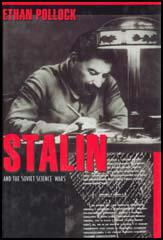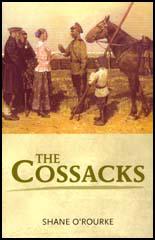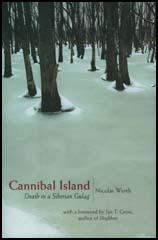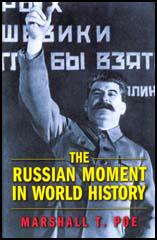Spartacus Review
Volume 3: 15th October, 2007
Russian History

Title: Stalin and the Soviet Science Wars
Author: Ethan Pollock
Editor:
Publisher: Princeton University Press
Price: £19.95
Bookshop: Amazon
Spartacus Website: Joseph Stalin
Category:
Between 1945 and 1953, while the Soviet Union confronted postwar reconstruction and Cold War crises, its unchallenged leader Joseph Stalin carved out time to study scientific disputes and dictate academic solutions. He spearheaded a discussion of "scientific" Marxist-Leninist philosophy, edited reports on genetics and physiology, adjudicated controversies about modern physics, and wrote essays on linguistics and political economy. Historians have been tempted to dismiss all this as the megalomaniacal ravings of a dying dictator. But in "Stalin and the Soviet Science Wars", Ethan Pollock draws on thousands of previously unexplored archival documents to demonstrate that Stalin was in fact determined to show how scientific truth and Party doctrine reinforced one another. Socialism was supposed to be scientific, and science ideologically correct, and Stalin ostensibly embodied the perfect symbiosis between power and knowledge. Focusing on six major postwar debates in the Soviet scientific community, this elegantly written book shows that Stalin's forays into scholarship can be understood only within the context of international tensions, institutional conflicts, and the growing uncertainty about the proper relationship between scientific knowledge and Party-dictated truths. The nature of Stalin's interventions makes clear that more was at stake than high politics: these science wars were about asserting that the Party was rational and modern, and about codifying the Soviet worldview in a battle for the hearts and minds of people around the globe during the early Cold War. Ultimately, however, the effort to develop a scientific basis for Soviet ideology undermined the system's legitimacy.

Title: The Cossacks
Author: Shane O'Rourke
Editor:
Publisher: Manchester University Press
Price: £15.99
Bookshop: Amazon
Spartacus Website: Russian Civil War
Category:
This is an exceptional book covering 500 years of the history of the Cossacks the recklessly brave, wild horsemen or the romantic hero of the steppe or the brutal mounted policemen, as they have been remembered throughout history. Starting with a description of the world of the steppe before moving on to a more detailed analysis of the circumstances in which the Cossacks emerged and flourished in the fifteenth and sixteenth centuries, the author considers the relationship of the Cossacks to the surrounding states in the seventeenth and eighteenth centuries through the prism of three great conflicts: the revolts of Bohdan Khelmnytsky, Stepan Razin and Emel ian Pugachev. The author then looks at the Cossacks from the end of the Pugachev revolt in 1774 until the outbreak of the First World War, as well as the Cossacks in the Russian revolutionary period and under Soviet power. A lucid and engaging book that conveys the passion, exuberance and tragedy of these extraordinary people, it will be enjoyed by students, scholars and general readers interested in Russian history.

Title: Cannibal Island: Death in a Siberian Gulag
Author: Nicolas Werth
Editor:
Publisher: Princeton University Press
Price: £14.95
Bookshop: Amazon
Spartacus Website: Stalin's Great Purges
Category:
During the spring of 1933, Stalin's police rounded up nearly one hundred thousand people as part of the Soviet regime's "cleansing" of Moscow and Leningrad and deported them to Siberia. Many of the victims were sent to labor camps, but ten thousand of them were dumped in a remote wasteland and left to fend for themselves. "Cannibal Island" reveals the shocking, grisly truth about their fate. These people were abandoned on the island of Nazino without food or shelter. Left there to starve and to die, they eventually began to eat each other. Nicolas Werth, a French historian of the Soviet era, reconstructs their gruesome final days using rare archival material from deep inside the Stalinist vaults. Werth skillfully weaves this episode into a broader story about the Soviet frenzy in the 1930s to purge society of all those deemed to be unfit. For Stalin, these undesirables included criminals, opponents of forced collectivization, vagabonds, gypsies, even entire groups in Soviet society such as the "kulaks" and their families. Werth sets his story within the broader social and political context of the period, giving us for the first time a full picture of how Stalin's system of "special villages" worked, how hundreds of thousands of Soviet citizens were moved about the country in wholesale mass transportations, and how this savage bureaucratic machinery functioned on the local, regional, and state levels. "Cannibal Island" challenges us to confront unpleasant facts not only about Stalin's punitive social controls and his failed Soviet utopia, but about every generation's capacity for brutality - including our own.

Title: The Russian Moment in World History
Author: Marshall T. Poe
Editor:
Publisher: Princeton University Press
Price: £8.95
Bookshop: Amazon
Spartacus Website: Joseph Stalin
Category:
Is Russian history one big inevitable failure? The Soviet Union's demise and Russia's ensuing troubles have led many to wonder. But, this is to look through a skewed prism indeed. In this provocative and elegantly written short history of Russia, Marshall Poe takes us well beyond the Soviet haze deep into the nation's fascinating - not at all inevitable, and in key respects remarkably successful - past. Tracing Russia's course from its beginnings to the present day, Poe shows that Russia was the only non-Western power to defend itself against Western imperialism for centuries. It did so by building a powerful state that molded society to its military needs. Thus arose the only non-Western path to modern society - a unique path neither "European" nor "Asian" but, most aptly, "Russian." From the fifteenth to the eighteenth centuries, Russia prevailed despite unparalleled onslaughts by powerful Western armies. However, while Europe nurtured limited government, capitalism, and scientific and cultural revolution, early Russian society cultivated autocracy and command economics. Both Europe and Russia eventually created modern infrastructures, but the European model proved more productive and powerful. The post-World War I communist era can be seen as a natural continuation of Russia's autocratic past that, despite its tragic turns, kept Russia globally competitive for decades. The Russian moment in world history thus began with its first confrontations with Europe in the fifteenth century, and ended in 1991 with the Soviet collapse. Written with verve and great insight, "The Russian Moment in World History" will be widely read and vigorously debated by those who seek a clear and unequivocal understanding of the complex history that has made Russia what it is today.
